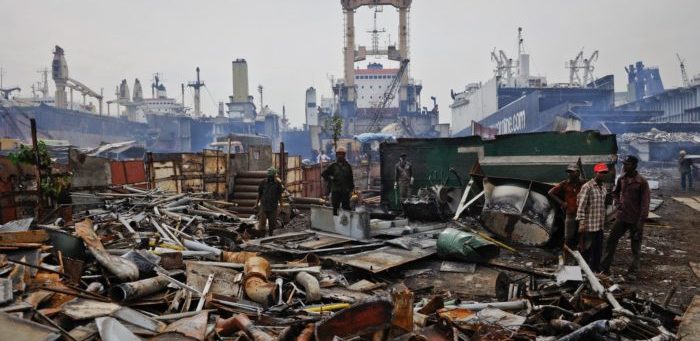A BBC Disclosure documentary investigation conducted by Mark Daly and Chris Foote journalists, revealed how shipbreaking activities in Alang, India caused severe harm to the environment. The disclosure pays attention to the illegally export attempt of a trio of floating rigs full of asbestos and mercury from the Scottish Cromarty Firth.
Namely, the documentary focuses on five rigs that were sold in 2017 by oil and gas company Diamond Offshore to cash buyer GMS, one of the leading scrap dealers for end-of-life vessels.
Two of the units, the Ocean Alliance and the Ocean Baroness left the Gulf of Mexico and ended up on the shipbreaking beach of Alang, India.
While the other three, the Ocean Nomad, the Ocean Vanguard and the Ocean Princess, are still detained in Cromarty Firth by the Scottish Environment Protection Agency (SEPA).
Our preference is that waste stays in Scotland and gets dealt with. If it’s going to move somewhere else, we need to make sure that it’s going to the right place, where it can be handled properly. If someone wants to do the wrong thing, it is our job to stop them.
…Terry A’Hearn, Chief Executive at SEPA said.
In light of the situation, the NGO Shipbreaking Platform had alerted SEPA n January 2018, only few days before the rigs were removed from the Cromarty Firt, that the units were possibly to end up on a South Asian beach for dirty and dangerous scrapping.
Moreover, the BBC Disclosure report shows how the Indian local authorities and leading oil and gas companies are involved in covering up their unlawful practices.
Companies sell their end-of-life tonnage to the beaching yards as that is where they can make the highest profit. But these are profits made on the back of exploited workers and fragile ecosystems. Alang is a toxic hotspot, and, without a proper clean-up, the pollution caused by more than three decades of reckless shipbreaking will continue to harm the local environment and the communities that depend upon it for many years to come.
…Ingvild Jenssen, Executive Director and Founder, NGO Shipbreaking Platform noted.
Workers’ interviews and undercover footage obtained by BBC at the Indian shipbreaking yard where the Ocean Alliance was taken apart highlight breaches of labor rights, disregard for even the most basic health and safety standards, and extremely polluting practices.
With 90% of the world’s end-of-life tonnage being currently scrapped using the low-cost method of beaching, oil and gas units are of particular concern following the complexity of the breaking operations and their contamination by highly toxic substances such as mercury and radioactive materials.
Many more offshore assets will need to be scrapped in the coming years. Companies that have owned and operated these units are responsible for ensuring that they are recycled without harming workers and the environment. For any unit having operated in the North Sea, there are more than enough options in Europe.
…Ingvild Jenssen concluded.

































































